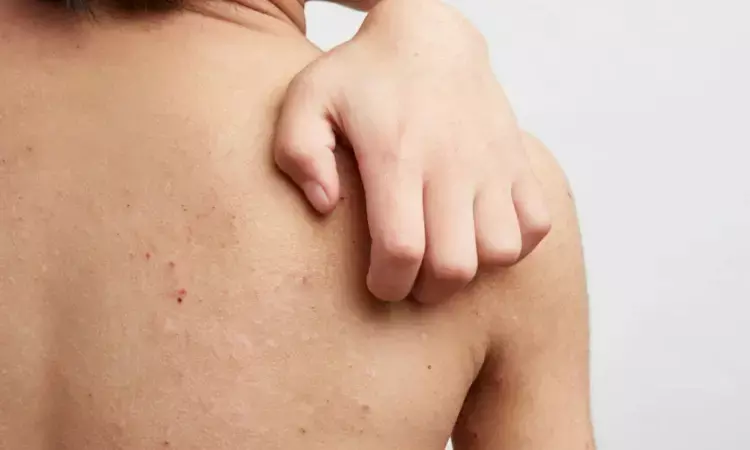- Home
- Medical news & Guidelines
- Anesthesiology
- Cardiology and CTVS
- Critical Care
- Dentistry
- Dermatology
- Diabetes and Endocrinology
- ENT
- Gastroenterology
- Medicine
- Nephrology
- Neurology
- Obstretics-Gynaecology
- Oncology
- Ophthalmology
- Orthopaedics
- Pediatrics-Neonatology
- Psychiatry
- Pulmonology
- Radiology
- Surgery
- Urology
- Laboratory Medicine
- Diet
- Nursing
- Paramedical
- Physiotherapy
- Health news
- Fact Check
- Bone Health Fact Check
- Brain Health Fact Check
- Cancer Related Fact Check
- Child Care Fact Check
- Dental and oral health fact check
- Diabetes and metabolic health fact check
- Diet and Nutrition Fact Check
- Eye and ENT Care Fact Check
- Fitness fact check
- Gut health fact check
- Heart health fact check
- Kidney health fact check
- Medical education fact check
- Men's health fact check
- Respiratory fact check
- Skin and hair care fact check
- Vaccine and Immunization fact check
- Women's health fact check
- AYUSH
- State News
- Andaman and Nicobar Islands
- Andhra Pradesh
- Arunachal Pradesh
- Assam
- Bihar
- Chandigarh
- Chattisgarh
- Dadra and Nagar Haveli
- Daman and Diu
- Delhi
- Goa
- Gujarat
- Haryana
- Himachal Pradesh
- Jammu & Kashmir
- Jharkhand
- Karnataka
- Kerala
- Ladakh
- Lakshadweep
- Madhya Pradesh
- Maharashtra
- Manipur
- Meghalaya
- Mizoram
- Nagaland
- Odisha
- Puducherry
- Punjab
- Rajasthan
- Sikkim
- Tamil Nadu
- Telangana
- Tripura
- Uttar Pradesh
- Uttrakhand
- West Bengal
- Medical Education
- Industry
Study Reveals Genotype-Dependent Benefits of Prenatal Fish Oil for Preventing Childhood Atopic Dermatitis

Denmark: A secondary analysis of a randomized clinical trial has uncovered significant insights into how prenatal fish oil supplementation impacts the risk of childhood atopic dermatitis (AD). The study reveals that the effectiveness of omega-3 long-chain polyunsaturated fatty acids (n-3 LCPUFAs) in preventing AD is influenced by the maternal COX1 genotype.
The findings, published in JAMA Dermatology, advocate for a personalized prevention approach to mitigate the risk of childhood atopic dermatitis by genotyping expectant mothers early in pregnancy and administering n-3 LCPUFA supplementation specifically to those with the COX1 TT genotype.
Eicosanoids play a role in the pathophysiology of atopic dermatitis. Yet, it remains unclear how prenatal supplementation with ω-3 long-chain polyunsaturated fatty acids (n-3 LCPUFAs, such as fish oil) and genetic variations in the cyclooxygenase-1 (COX1) pathway influence this process. Considering this, Liang Chen, University of Copenhagen, Copenhagen, Denmark, and colleagues aimed to investigate the relationship between prenatal n-3 LCPUFA supplementation and the risk of childhood atopic dermatitis, both generally and with maternal COX1 genotype.
The prespecified secondary analysis of a randomized clinical trial utilized data from the Danish Copenhagen Prospective Studies on Asthma in Childhood 2010 birth cohort, tracking mother-child pairs with follow-up until the children reached 10. The study, conducted from January 2019 to December 2021 with data analysis from January to September 2023, involved determining maternal and child COX1 genotypes and quantifying urinary eicosanoids when the children were one year old.
In the original trial, 736 pregnant women at 24 weeks of gestation were randomly assigned to receive either 2.4 grams of n-3 LCPUFA (fish oil) or a placebo (olive oil) daily until one week postpartum. The analysis focused on assessing the risk of childhood AD by the age of 10 and by maternal COX1 genotype.
The following were the key findings of the study:
- At age ten years, 635 children (57% female) completed the clinical follow-up, and these mother-child pairs were included in this study; 321 were in the intervention group and 314 in the control group.
- Pregnancy n-3 LCPUFA supplementation was associated with lower urinary thromboxane A2 metabolites at age one year (β, –0.46), which was also associated with COX1 rs1330344 genotype (β per C allele, 0.47).
- Although neither n-3 LCPUFA supplementation (hazard ratio [HR], 1.00) nor maternal COX1 genotype (HR, 0.94) was associated with the risk of childhood AD until age ten years, there was evidence of an interaction between these variables.
- Among mothers with the TT genotype, the risk of AD was reduced in the n-3 LCPUFA group compared with the placebo group (390 mother-child pairs; HR, 0.70); there was no association for mothers with the CT genotype (33%; HR, 1.29), and risk was increased among offspring of mothers with the CC genotype (6%; HR, 5.77).
- There was a significant interaction between n-3 LCPUFA supplementation and child COX1 genotype and the development of AD.
The secondary analysis of a randomized clinical trial discovered that prenatal n-3 LCPUFA supplementation was linked to a reduced risk of childhood atopic dermatitis at age ten only in mothers with the COX1 rs1330344 TT genotype. There was no significant association overall or in mothers with the CT genotype, while children of mothers with the CC genotype exhibited an increased risk of atopic dermatitis.
"These findings could guide a personalized prevention strategy, recommending supplementation exclusively for pregnant individuals with the TT genotype," the researchers concluded.
Reference:
Chen L, Brustad N, Luo Y, et al. Prenatal Fish Oil Supplementation, Maternal COX1 Genotype, and Childhood Atopic Dermatitis: A Secondary Analysis of a Randomized Clinical Trial. JAMA Dermatol. Published online August 28, 2024. doi:10.1001/jamadermatol.2024.2849
Dr Kamal Kant Kohli-MBBS, DTCD- a chest specialist with more than 30 years of practice and a flair for writing clinical articles, Dr Kamal Kant Kohli joined Medical Dialogues as a Chief Editor of Medical News. Besides writing articles, as an editor, he proofreads and verifies all the medical content published on Medical Dialogues including those coming from journals, studies,medical conferences,guidelines etc. Email: drkohli@medicaldialogues.in. Contact no. 011-43720751


